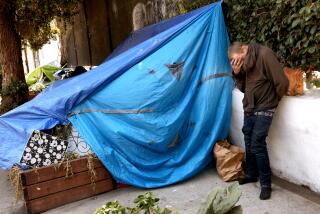Directors Delay Decision on Store Plan : Commerce: Proposed store at Fair Oaks mall has heightened tension between blacks and Koreans.
- Share via
PASADENA — A contested proposal for a swap-meet-style store in Northwest Pasadena--cited by proponents as yet another example of strained relations between African-Americans and Korean-Americans--stymied the Board of Directors on Tuesday.
After more than three hours of discussion in chambers filled with blacks and Koreans, the board, sitting as the Community Redevelopment Commission, postponed for a week a decision on the proposed Fair Oaks Department Store.
The postponement allows the board time to tour the site of the proposed store at 625 N. Fair Oaks Ave. in the Fair Oaks/Orange Grove shopping center.
It also allows the board time to study a number of complicated legal questions arising from the project and from a lawsuit filed in May against the city by the store’s applicants.
Victor Harris, one of three partners in the proposed store, said Tuesday that he expects the board to return in a week and, following the lead of two city committees, vote against the project. Pasadena officials oppose the store, not because of legal objections, Harris contended, but because his two partners are Koreans. Harris is black.
“They want to see blacks; they don’t want to see a shop with a bunch of Koreans in there,” Harris said of city officials.
Last Friday, about 50 Koreans and other supporters of the store picketed outside City Hall, claiming that city staff and two citizens committees have blocked the store’s opening because of racism.
But Jim Hall, chairman of the Fair Oaks Project Area Committee, a group overseeing redevelopment in that part of Northwest Pasadena, denied that race or ethnicity has affected his committee’s opposition or that of the Community Development Committee.
“The primary issue is whether this use is consistent with the (Fair Oaks) redevelopment plan and with good redevelopment,” Hall said. “A swap meet will have a strong negative impact on the redevelopment area and Northwest Pasadena in general.”
The proposed store would convert a 20,000-square-foot, former Thrifty Drug Store into stalls for 38 vendors who would rent space monthly. Korean businessman Paul Cho, one of Harris’ partners, has for four years operated a similar store in Inglewood called the Inglewood Department Store.
A similar Korean-run business called the L.A. Slauson Swapmeet operates in Los Angeles.
In a phenomenon that has been occurring nationally, both the Inglewood and Los Angeles stores have been criticized by black community activists for alleged insensitivity toward black customers.
Awareness of the strained relations between African-Americans and Korean-Americans reached a peak earlier this year when blacks in the Flatbush area of Brooklyn began picketing outside Korean grocery stores to protest the alleged beating of a Haitian customer and what they called ongoing disrespectful treatment of black customers by Korean merchants.
The dispute garnered national attention, especially since it seemed to mirror strained Korean and black relations portrayed in Spike Lee’s 1989 movie, “Do the Right Thing.”
Since then, similar accusations have been leveled in other urban areas nationwide. A Los Angeles group calling itself OMNI, the Organization of Mutual Neighborhood Interest, picketed both the Inglewood and Slauson stores last December over such concerns.
But Harris, whose public relations company represents Cho’s Inglewood store, said the pickets were outsiders unfamiliar with the scholarships and food donations made by Cho to the Inglewood community.
Cho intends to duplicate his commitment to community service in Pasadena, Harris said.
However, plans for Cho’s Pasadena store have foundered because the store is inside the redevelopment area. Before building permits can be issued for projects in the area, they must be reviewed by the Fair Oaks Project Area Committee and the Community Development Committee.
In Cho’s case, city officials mistakenly issued building permits in February and March, then in April retroactively put a hold on the project and told Cho that the proposed store needed to be considered by the two committees.
Cho responded by filing a lawsuit in Los Angeles Superior Court, arguing that the two committees had no authority to intervene in the issuance of a simple building permit. Both committees subsequently denied approval for the store, citing concern over lack of sufficient parking for the store and fears that the store’s lower-priced vendors would drive neighborhood shops out of business.
Cho’s lawsuit is still pending. A scheduled Aug. 8 court hearing on it will probably be rescheduled because of the board’s postponement of a decision Tuesday, lawyers involved in the case said.
During the board meeting, Cho’s attorney, Douglas Ring, accused the city of “selective enforcement,” saying that no other project in the Fair Oaks area had been singled out for consideration by the two committees.
Ring also argued that the proposed store would operate more like a department store than a swap meet, which opens temporarily for only 48 hours at a time.
Still, some neighborhood residents remained opposed to the store, saying it would not upgrade the area and would increase crime by encouraging loiterers to gather inside the building.
“The community here is very worried,” said resident Stephen Mack. ‘We cleaned up the place and ran the drunkards off, and now are you going to turn around and convert it back to the same thing we got rid of?’ ”
City directors also expressed concern that the store failed to meet a redevelopment goal of providing jobs to local residents. The board asked for city staff to return in a week with, among other things, a legal opinion on whether the city can require such a goal as a condition of approval.
More to Read
Sign up for Essential California
The most important California stories and recommendations in your inbox every morning.
You may occasionally receive promotional content from the Los Angeles Times.










